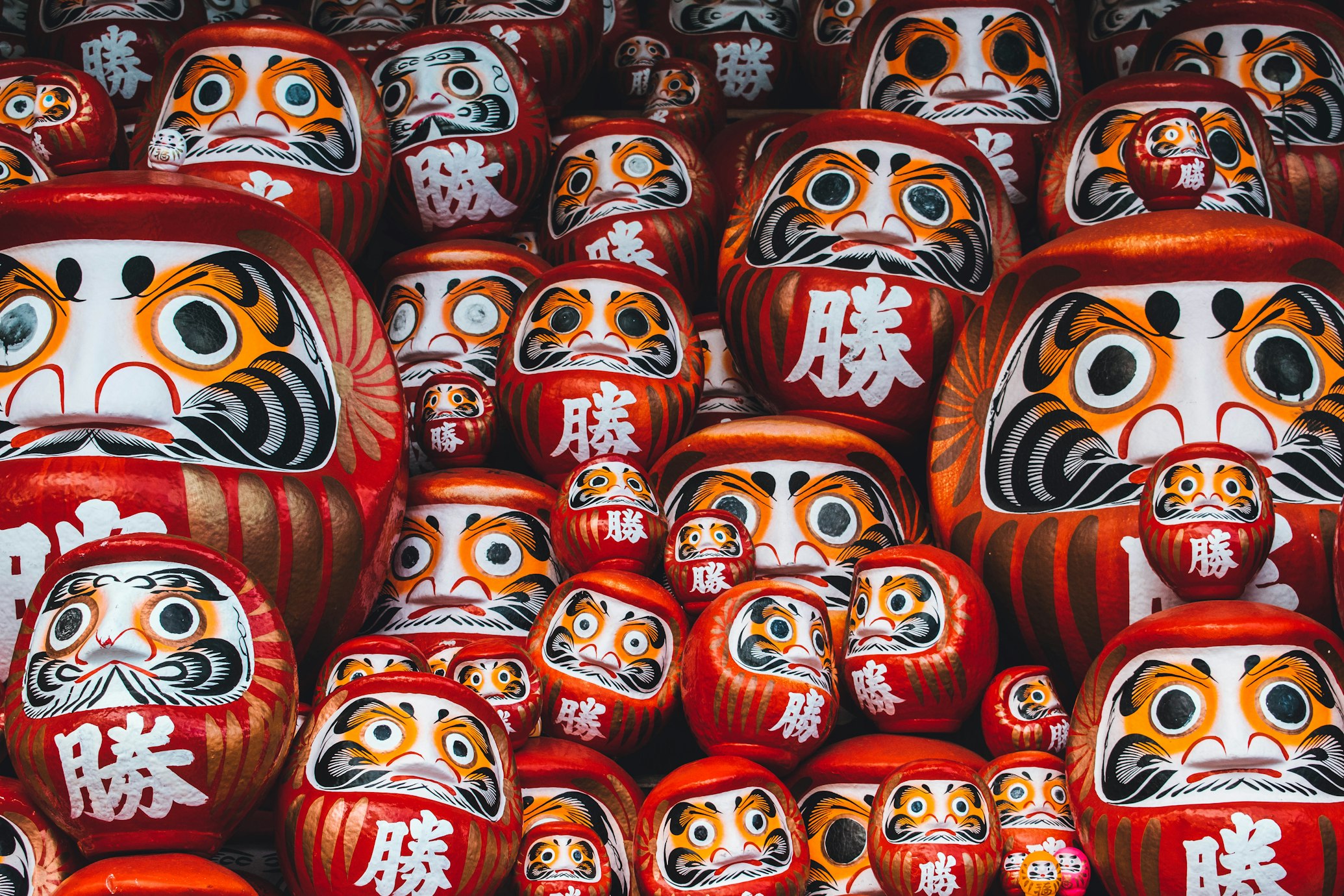In addition to the ubiquitous maneki neko (good luck cat), you’ve probably seen another good luck emblem called the Daruma around. With their distinctive red colour and angry-looking face with wild eyes and an unkempt beard, Daruma dolls are usually found at Japanese restaurants across Singapore.
More than just a Japanese souvenir, these Daruma dolls are there to watch over your goals – and they’ve also been popularly used to help students pass exams. However, the talisman doesn’t grant your wish because it serves as a reminder of your own life goals.
The features of a Daruma doll
The Daruma is said to be modelled after Bodhidharma (hence the Japanese ‘daruma’ or dharma), a monk from the the 5th and 6th century credited with the founding of Zen Buddhism. Everything from the Daruma’s shape to its colour has deep roots and meaning.
Eyes: A noticeable feature of the Daruma is its blank eyes which are more like large white circles – and they actually serve a purpose. When you receive a Daruma, you create a goal (maybe you want to pass an exam) and then you colour in one of the eyes. So until you achieve your goal, the Daruma will have one eye staring at you to remind you of your purpose.
Once you’ve reached your goal, you paint the other eye in, thus fulfilling the Daruma’s purpose. So whenever you see a Daruma with two eyes, you’re looking at someone who’s accomplished their goal.

This is why Darumas are often given as gifts to people who are aiming for something. Common goals include getting into the university of their choice, passing an exam, or accomplishing a personal feat. One of the theories behind this blank eye is linked to the legend of Bodhidharma removing his own eyelids because he was furious at himself for closing his eyes once while meditating.
Shape: The Daruma’s round shape and weighted bottom gives it a low centre of gravity, so no matter how hard you push it, the doll will always right itself back up. It exemplifies the Japanese proverb “nana korobi ya oki,” meaning “fall down seven times, stand up eight” and symbolises the determination to succeed. Daruma dolls also have something scarily similar to Bodhidharma: both have no legs, because according to legend, the monk meditated for so long his legs atrophied.
Facial hair: The facial hair – messy and unkempt – is meant to reproduce Bodhidharma’s facial features. But also, the eyebrows are shaped to look like cranes, and the beard like turtles – both animals often represent longevity.
Kanji text: There’s a kanji script (traditional Chinese) written on the midsection of the Daruma – commonly “luck”, “fortune”, or similar.
Colour: Traditionally, Daruma dolls are often red – and it’s theorised that it’s because Bodhidharma and Buddhist priests clad themselves in robes of a similar colour. Red is also a traditionally lucky colour. These days, other colours can be found, each with a different meaning. In Japan, yellow/gold is linked to money; purple is for wisdom; black wards off bad luck; and green symbolises health.
Daruma in Japan
While you can find Daruma dolls almost everywhere in Japan, Takasaki in Gunma Prefecture is the place of origin where over 80% of all of Japan’s Daruma are made. All Daruma are handmade and hand-painted, so no two dolls look exactly alike.
At Shorinzan Daruma-ji temple, built in 1697, you can find Daruma of all sizes, tucked into every nook and cranny of the temple and its buildings. You can also find huge collections of Daruma at Hourinji Temple in Kyoto (aka the “Daruma Temple”) which has over 8,000 dolls, and the Katsuo-ji Temple in Osaka where the dolls are crammed in every corner of the temple.

In Japan, there’s a ritual related to the Daruma dolls. After a year with the Daruma, people return it to the temple they got it from and burn it, regardless of whether they succeeded in their goals. The most popular time to burn them is during the New Year in a ceremony called daruma kuyo or dondoyaki which is held in temples across Japan.
In conclusion…
So, if you know someone who’s trying to get into the school of their choice, pass an exam, or simply needs a bit of luck, gift them a Daruma! Hopefully you’ll get to see it with both of eyes coloured in, knowing that you gave someone that extra bit of push they needed to complete their wish.












